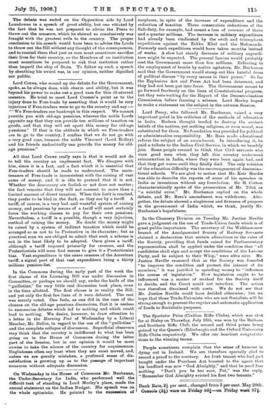Lord Percy, who followed Mr. Buchanan, raised a very important
point in his criticism of the methods of education in India. Modern thought tended to destroy the ancient beliefs of the natives, yet nothing religious, or even moral, was substituted for them. No foundation was provided for political or administrative responsibility. Mr. Rees made educational reform the subject of an amendment. In introducing it, lie paid a tribute to the Indian Civil Service, in which we heartily join. Some people seemed to think that Civil servants who were good men when they left this country underwent reincarnation in India, where they were born again bad, and that they got worse until they finally died. The only solution of the education difficulty was the encouragement of denomina- tional schools. We are glad to notice that Mr. Keir Hardie was able to describe the reports of some of his speeches in India as inventions without any foundation. Sir H. Cotton characteristically spoke of the prosecution of Mr. Tilak as "a suicidal error." Mr. Buchanan replied on the whole debate, and Mr. Rees's amendment was withdrawn. Alto- gether, the debate showed a singleness and firmness of purpose in the government of India which, we think, justify Mr. Buchanan's hopefulness.






































 Previous page
Previous page